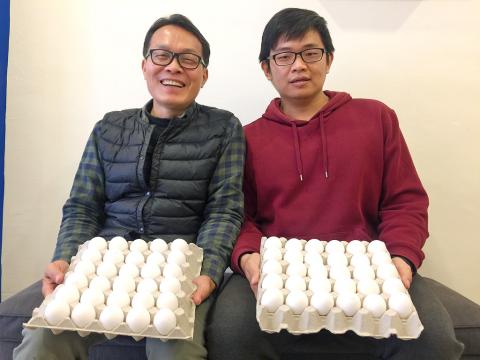JD-SPF Biotech Co in Miaoli County’s Sanwan Township (三灣) produces what might be the nation’s cleanest and most expensive eggs, which are mainly used for research.
The farm was founded in 2012 by Liang Chi-feng (梁奇鳳), a former researcher at the Council of Agriculture’s Animal Health Research Institute.
After retiring from the institute at the age of 51, Liang invested his savings and pension to set up a specific-pathogen-free (SPF) chicken farm, which opened in 2014.

Photo: Hung Yu-fang, Taipei Times
The farm, which cost him about NT$50 million (US$1.7 million at the current exchange rate) to build, supplies eggs to research institutes that need SPF eggs to produce vaccines, said Liang, who is also its general manager.
Liang said he had carefully chosen a SPF-certified chicken breed imported from abroad.
The chickens at his farm are vaccine-free and are raised in controlled environment, he added.
The air in the poultry house goes through multiple filtering systems to prevent specific pathogens from entering and water supplied to the chickens are purified through reverse osmosis systems before being boiled, he said.
The farm contracts special factories to produce its own chicken feed, which must be free of antibiotics and drugs, Liang said, adding that the company periodically checks its facilities and feed for quality control.
The air pressure and temperature in the poultry houses are also controlled, with the latter set between 24°C and 28°C.
“The electricity fee alone costs NT$100,000 per month,” Liang said.
Visitors to the farm must first be sprayed with chlorine dioxide for disinfection before they can enter, he said, adding that most people are not allowed to enter the poultry houses at all — not even his son, who is responsible for delivering the eggs.
Before staff members can enter the poultry houses, they must undergo a cleansing process, which includes wiping the inside of their nose and ears with alcohol, and putting on masks, hats and special suits that cover their entire bodies.
The farm has 2,000 chickens, which produce a maximum of 700,000 eggs per year.
The SPF eggs, on average, sell for NT$90 to NT$100 each, including shipping fees.
Biotech companies and institutions — including Academia Sinica’s Genomics Research Center, the National Defense Medical Center’s Institute of Preventive Medicine, National Taiwan University, National Chiao Tung University, National Chung Hsing University and National Pingtung University of Science and Technology — source their eggs from Liang for their vaccine research.
SPF eggs that cater to vaccine researchers have a limited market, Liang said, but added that he has not given up on the business because he feels a sense of responsibility.
SPF eggs imported from abroad cost at least five times more than locally produced ones, he said.
To expand his market, Liang is hoping to obtain certification that would allow his eggs to be sold in Japan and South Korea.
Following a recent scandal involving expired eggs, he has launched a new drive to market his eggs as toxin-free food for consumers.
The company is also conducting research on producing chicken essence, chicken floss, soap and other products to ensure sustained business growth.

“China is preparing to invade Taiwan,” Deputy Minister of Foreign Affairs Francois Wu (吳志中) said in an exclusive interview with British media channel Sky News for a special report titled, “Is Taiwan ready for a Chinese invasion?” the Ministry of Foreign Affairs said today in a statement. The 25-minute-long special report by Helen Ann-Smith released yesterday saw Sky News travel to Penghu, Taoyuan and Taipei to discuss the possibility of a Chinese invasion and how Taiwan is preparing for an attack. The film observed emergency response drills, interviewed baseball fans at the Taipei Dome on their views of US President

The Central Weather Administration (CWA) today issued a "tsunami watch" alert after a magnitude 8.7 earthquake struck off the Kamchatka Peninsula in northeastern Russia earlier in the morning. The quake struck off the east coast of the Kamchatka Peninsula at 7:25am (Taiwan time) at a depth of about 19km, the CWA said, citing figures from the Pacific Tsunami Warning Center. The CWA's Seismological Center said preliminary assessments indicate that a tsunami could reach Taiwan's coastal areas by 1:18pm today. The CWA urged residents along the coast to stay alert and take necessary precautions as waves as high as 1m could hit the southeastern

ECONOMIC BENEFITS: The imports from Belize would replace those from Honduras, whose shrimp exports have dropped 67 percent since cutting ties in 2023 Maintaining ties with Taiwan has economic benefits, Ministry of Foreign Affairs officials said yesterday, citing the approval of frozen whiteleg shrimp imports from Belize by the Food and Drug Administration (FDA) as an example. The FDA on Wednesday approved the tariff-free imports from Belize after the whiteleg shrimp passed the Systematic Inspection of Imported Food, which would continue to boost mutual trade, the ministry said. Taiwan’s annual consumption of whiteleg shrimps stands at 30,000 tonnes, far exceeding domestic production, the ministry said. Taiwan used to fill the gap by importing shrimps from Honduras, but purchases slumped after Tegucigalpa severed diplomatic ties with Taiwan

The Executive Yuan yesterday approved a southwestern extension of the Sanying MRT Line from New Taipei to Bade District (八德) in Taoyuan, with a goal of starting construction by late 2026. The 4.03-kilometer extension, featuring three new stations, will run from the current terminus at Yingtao Fude Station (LB12) in New Taipei City to Dannan Station (LB14), where it will connect with Taoyuan’s Green Line, New Taipei City Metro Corp said in a statement. This extension will follow the completion of core Sanying Line, a 14.29-kilometer medium-capacity system linking Tucheng (土城), Sansia (三峽)